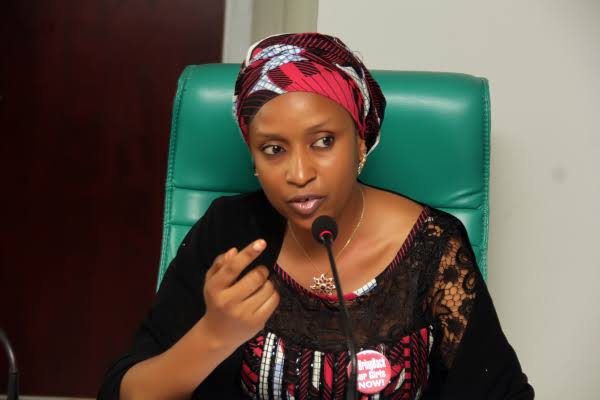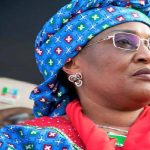...To get all news updates, Join our WhatsApp Group (Click Here)
Also Join our WhatsApp Channel (Click Here)
Strong indications emerged on Friday that alleged non-remittance of 2016-2020 operating surpluses of N165.3 billion to the Federation Account by the Nigeria Ports Authority (NPA) may have led to the suspension of the Managing Director of the agency, Hadiza Bala Usman.
Her suspension also stemmed from alleged insubordination to Transportation Minister Rotimi Amaechi under whose ministry is the NPA.
Hadiza, according to sources, had not been attending some vital ministerial briefings as chief executive of one of the parastatals under the Ministry of Transportation.
But some political forces opposed to her suspension have launched a move to rescue her.
The Nation on Friday sighted some documents from the Budget Office of the Federation on the finances of the NPA between 2016 and 2020, which sources said convinced President Muhammadu Buhari to approve Hadiza’s probe.
Amaechi, it was gathered, wrote a memo to the President recommending a ministerial investigation of the activities of NPA under Hadiza.
The memo entitled: “Remittance of operating surplus to the consolidated revenue fund account (CRF) by the Nigerian Ports Authority from 2016 –date,” elaborates on the revenue shortfall in NPA.
“It has been observed from the records submitted by the Budget Office of the Federation that the yearly remittance of operating surpluses by the Nigerian Ports Authority from the year 2016 to 2020 has been far short of the amount due for actual remittance (see the tables attached),” the Minister said.
“In view of the above, I wish to suggest that the financial account of the activities of Nigeria Ports Authority be investigated for the period to 2020 to ascertain the true financial position and the outstanding unremitted balance of one hundred and sixty-five billion, three hundred and twenty million, nine hundred and sixty-two thousand, six hundred and ninety seven naira only (N165,320,962,697).”
Also Read: https://www.societyreporters.com/npa-md-hadiza-bala-usman-swims-in-n20bn-contract-fraud/
He asked the President to “approve that the account and remittance of NPA in the period of 2016-2020 be audited to account for the gross shortfall of remitted public funds.”
In response to the letter, the President on the 17th of March wrote on the letter: “Your above prayer is approved.”
A separate letter on 30th March was written to the Minister of Transportation by the Chief of Staff to the President, Prof. Ibrahim Gambari.“The letter, “Re-remittance of operating surplus to the consolidated revenue fund account (CRF) by the Nigerian Ports Authority from 2016-2020”, said: “Reference letter FMT/F7A/DFA/DMP/I/DI, dated 4th March 2020, I write to forward Reference A to you and to convey to you Mr. President’s approval of your prayers.
Findings however confirmed that the observations of the Budget Office of the Federation and insider’s abuse were “official justifications” to rein in Hadiza.
It was learnt that there were over 100 issues covering some of the following:
Alleged gross violation of procurement process
Administrative lapses leading to non-remittance of VAT deductions running into billions of naira and in foreign currency denomination to the Federal Inland Revenue Service.
Alleged excessive increase in administrative operational expenses.
Extra budgetary expenditures on hotel accommodation and under disclosure of expenditures on hotel expenses.
Alleged inflation of CSR expenses
About 573% rise in expenditure on local and foreign medical expenses, legal fees, corporate souvenirs and expenditure
Alleged increase in administrative cost by 72%
But an authoritative source said the strain in the relationship between the Minister of Transportation and the suspended MD might have fueled the action against her.
Another insider source said: “I think her suspension was the climax of the six-year cold war with her boss (Amaechi). The Minister actually recommended her for the job in 2016 and they started well.
“Along the line, the NPA MD assumed an independent status and refused to defer to Amaechi on the activities and management of the Ports Authority. It got to a stage that the minister never knew what was going on in NPA except through a third party.
“The alleged act of insubordination included refusal of the NPA MD to attend any ministerial briefing or meeting convened by Amaechi.
Also Read: https://www.societyreporters.com/exposed-how-npa-boss-hadiza-bala-usman-makes-business-unbearable-for-lagos-businessmen/
“Even when she wielded political influence to put NPA under the control of the Minister of State for Transportation, Sen. Gbemisola Saraki, her attitude did not change.
“The ‘miraculous’ manner in which she got reappointment for second term six months before the expiration of her tenure confirmed the breakdown of her relationship with Amaechi.
“The minister, who was waiting for the expiration of her tenure to make a point, was shocked to read about the announcement of her reappointment.”
Responding to a question, the source added: “When the minister tried to use the board to check Hadiza, it was not successful because of her high net worth political connection.”
A government source said although President Buhari was yet to hear from Hadiza, he opted for investigation to get a clearer picture.
The source said: “Once issues of alleged fraud or corruption and disloyalty are brought to the attention of the President, he does not waste time in acting. Those who are good in Presidential Villa politics have used Buhari’s disdain for corruption to their advantage.
“Buhari approved immediate suspension of the MD and investigation at the same time.”
It was gathered last night that some political forces had commenced underground moves to save Hadiza.
“There is intense lobbying by some forces for either the reversal of the suspension of Hadiza or an independent probe of the activities of NPA under her watch,” a source familiar with the development told The Nation.
“Those backing Hadiza claimed that she cannot get justice from an investigative committee raised by the minister.”
But a source in the Ministry of Transportation said: “It is unfortunate that some people are turning a serious case into a dispute between the Minister and Hadiza.
“Amaechi has lived with the insubordination in the last five years without complaining. Why are they not addressing the N165.3b surpluses unremitted by NPA?”
Additional Information From The Nation
You can get every of our news as soon as they drop on WhatsApp ...To get all news updates, Join our WhatsApp Group (Click Here)
Also Join our WhatsApp Channel (Click Here)

















